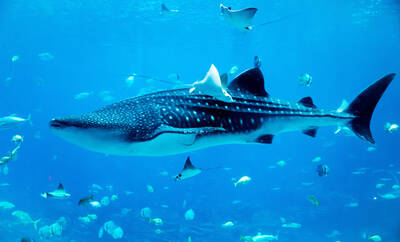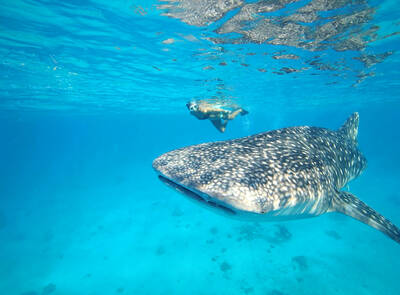Chinese Practice
得寸進尺
(de2 cun4 jin4 chi3)

Photo: Paul Cooper, Taipei Times
照片:台北時報記者古德謙攝
Give him an inch and he’ll take a mile
「得寸進尺」是個有趣的成語,有許多值得一提之處。首先,「得寸進尺」在英語中有十分雷同的說法,即 give him an inch and he’ll take a mile( 讓他一英吋,他就會多進一英里),意指做出讓步後,對方變得貪得無饜,即便最初的讓步看似微不足道,對方卻越要越多。
此外,「得寸進尺」出自一個很有趣的故事,原與中國古代的軍事戰略「遠交近攻」有關。
隨著時代演進,這個成語發展出了不同的意思,這也是相當有趣的一點。現今「得寸進尺」用來指人貪得無饜,索求無度,和最初的意思已經大不相同。
「得寸進尺」一成語出自《戰國策.秦策三》。在戰國時代,秦、韓、趙、魏、齊、楚、燕七雄爭霸,其中以東方濱海的齊國最為強大。在秦國統一中國,建立秦朝以前,秦昭王有位策士叫范雎,他原為魏國人,但為了報復魏王而投靠秦國。
范雎勸諫秦昭王不要出兵攻打較遠的齊國,以免過度耗損兵力,並導致國內守兵不足。他建議秦昭王先與齊國合作,並同時逐步奪取鄰近國家的土地,多一寸算一寸,多一尺算一尺。他提出的戰略雖是野心勃勃,卻又相當謹慎。
秦昭王在秦國統一天下前即去世,但他在秦國的統一大業中扮演了重要的角色。
英文的Give him an inch and he’ll take a mile一說法,原為 give him an inch and he’ll take an ell,因英里是二十世紀左右才出現的單位,在其之前用的是ell。ell是一個人的前臂的長度,該詞雖已不再使用,但是從中衍生出elbow 一詞,即「前臂彎曲處」,也就是手肘。(台北時報編譯涂宇安譯)
和他打交道不必太慷慨,對他太好,他只會得寸進尺。
(You don’t want to be over-generous with that guy. He’ll only take advantage.)
我上次借他一萬元他都還沒還,今天居然又想跟我借更多錢,真是得寸進尺。
(I gave him NT$10,000 last time, and he still hasn’t given it back. Now he only wants to borrow some more. It really is give him an inch...)
英文練習
Give him an inch and he’ll take a mile
The idiom 得寸進尺 is very interesting for several reasons.
First of all, it has a very close equivalent in English: “give him an inch and he’ll take a mile.” That is, if you allow somebody something even apparently inconsequential, they may well become greedy and try to get more from you.
The second reason it is interesting is that the backstory involves an ancient Chinese military strategy perhaps best written as “befriend those far from you and attack those that are near.”
A third reason it is interesting is that the metaphorical meaning that has evolved — to describe behavior in which someone is being greedy and insatiable, or is never satisfied — is actually quite different from the original meaning.
The idiom originates from the Strategies of Qin from the ancient historical document Strategies of the Warring States. There were seven states in all at the time: Qin, Han, Zhao, Wei, Qi, Chu and Yan. Qi, on the eastern seaboard, was the strongest. Qin was the far western state that would eventually unify China, under the Qin dynasty. Fan Ju, an advisor to King Zhao of Qin, was born in Wei, but wanted revenge on the Wei ruler.
Fan advised King Zhao not to send his armies to attack Qi. This would risk overextending Qin’s forces and leaving its own territory inadequately defended. Far better, he said, to make an alliance with Qi for the time being, and in the meantime gain territory incrementally, inch by inch, foot by foot, from the nearest states. It was, then, an ambitious — yet cautious — strategy of conquest.
The king himself was dead before Qin unified China, but he was instrumental to the process.
The English phrase was originally written “give him an inch and he’ll take an ell.” The use of “mile” dates from about 1900. Before that, an ell was used as a measure, meaning the length of a forearm. The term would later become obsolete, but it’s where the word “elbow” — the “bend of the forearm” — comes from.(Paul Cooper, Taipei Times)
Be careful what you promise him. Give the man an inch and he’ll take a mile.
(不要隨便他答應他事情,他會得寸進尺的。)
I said he could make a quick call on my phone, but he’s been on it for three hours now. Talk about giving an inch…
(我同意讓他借用一下我的手機,結果他一講就是三小時,真是得寸進尺。)

A: The news says comic superstar Snoopy’s birthday is coming soon on Aug. 10. B: So he’s a Leo, and his birthday will fall on this Sunday. A: Cartoonist Charles Schulz created the comic strip Peanuts, featuring Snoopy, in 1950. And this year marks the character’s 75th anniversary. B: No wonder there are some big celebrations in Japan, Hong Kong and elsewhere. How about Taiwan? A: The “How Do You Do, Snoopy?” exhibition is taking place in Taipei. Let’s go to Shin Kong Mitsukoshi Department Store’s A11 branch to see the show. A: 新聞說,卡通巨星史努比的生日是8月10日耶。 B: 原來史努比是獅子座,本週日就是他的生日。 A: 漫畫家查爾斯舒茲1950年在《花生》漫畫創造了該角色,今年正好歡慶75週年! B:

A: Apart from the “How Do You Do, Snoopy?” exhibition, the Penghu International Fireworks Festival displayed some Snoopy-themed balloon installation art. B: The Yilan International Children’s Folklore & Folkgame Festival also displayed a giant rubber “Snoopy Duck.” A: And Starbucks, Kura Sushi and 7-Eleven are all selling Snoopy-themed products. B: Starlux Airlines even launched new Snoopy-themed flights recently. Isn’t that cool? A: Taiwanese love Snoopy so much. Happy 75th birthday, Snoopy. A: 除了《How Do You Do, Snoopy?花生漫畫75週年特展》,澎湖海上花火節展出了史努比氣球裝置藝術。 B: 而宜蘭國際童玩藝術節,則展出了巨型「史努比鴨」。 A: 星巴克、藏壽司、7-Eleven也推出了史努比聯名商品。 B: 星宇航空今年更推出全新「Snoopy主題航班」,很酷吧? A: 台灣人好愛史努比啊,75歲生日快樂!

Whale sharks are the largest species of fish in the world. They aren’t related to whales, but take their name due to their enormous size. At full maturity, whale sharks measure around nine or 10 meters long and can weigh from 15,000 to 40,000 kilograms. Whale sharks live in warm waters, with about 75% of them found in the Indo-Pacific region. They can migrate thousands of kilometers to different feeding grounds, but at a slow speed of 5 km/h on average. Whale sharks have a broad, flat head and are typically brown or gray in color. Their distinguishing characteristic

Continued from yesterday(延續自昨日) https://www.taipeitimes.com/News/lang Whale shark reproduction has long been a mystery for scientists. However, a significant discovery in 1995 off the eastern coast of Taiwan provided valuable insights. Researchers examined a pregnant female of the species and found over 300 embryos inside her body, ranging from about 40 to 60 cm in length. This discovery revealed that whale sharks are ovoviviparous. Instead of laying eggs in the ocean, the mother carries them internally until they hatch, giving birth to fully developed live young. Since the eggs don’t hatch all at once, embryos at different stages of development can all exist within